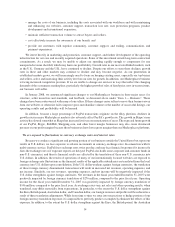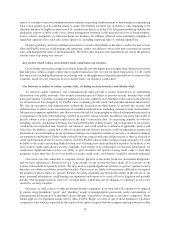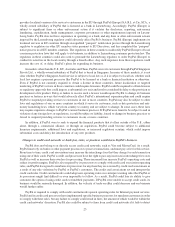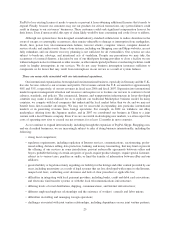eBay 2007 Annual Report Download - page 26
Download and view the complete annual report
Please find page 26 of the 2007 eBay annual report below. You can navigate through the pages in the report by either clicking on the pages listed below, or by using the keyword search tool below to find specific information within the annual report.Communications segments. These claims, whether meritorious or not, are time consuming and costly to resolve,
and could require expensive changes in our methods of doing business, could require us to enter into costly royalty
or licensing agreements, or could require us to cease conducting certain operations.
Use of our services for illegal purposes could harm our business.
The law relating to the liability of providers of online services for the activities of their users on their service is
often challenged in the U.S. and internationally. Certain goods, such as weapons, adult material, tobacco products,
alcohol, and other goods that may be subject to regulation have been listed and traded on our services. We may be
unable to prevent our users from selling unlawful goods or services or selling goods or services in an unlawful
manner, and we may be subject to allegations of civil or criminal liability for unlawful activities carried out by users
through our services. We have been subject to several lawsuits based upon such allegations. In December 2004, an
executive of Baazee.com, our Indian subsidiary, was arrested in connection with a user’s listing of a pornographic
video clip on that website. Similarly, our Korean subsidiary and one of its employees were found criminally liable
for listings on the Korean subsidiary’s website. The German Federal Supreme Court has ruled that we may have a
duty to take reasonable measures to keep prohibited DVDs from being sold on our site to minors and that
competitors may be able to enforce this duty. Although we have prohibited the listing of certain items and
implemented other protective measures, in the future, we may be required to spend substantial resources to take
additional protective measures or discontinue certain service offerings, any of which could harm our business. Any
costs incurred as a result of potential liability relating to the sale of unlawful goods or the unlawful sale of goods
could harm our business. In addition, we have received significant and continuing media attention relating to the
listing or sale of unlawful goods using our services. This negative publicity could damage our reputation and
diminish the value of our brand names. It also could make users reluctant to use our services.
PayPal’s payment system is also susceptible to potentially illegal or improper uses. These may include illegal
online gambling, fraudulent sales of goods or services, illicit sales of prescription medications or controlled
substances, piracy of software and other intellectual property, money laundering, bank fraud, child pornography
trafficking, prohibited sales of alcoholic beverages or tobacco products, and online securities fraud. Recent changes
in law have increased the penalties for intermediaries providing payment services for certain illegal activities.
Despite measures PayPal has taken to detect and lessen the risk of this kind of conduct, including PayPal’s ability to
fine users in certain jurisdictions up to $500 or take legal action to recover its losses for certain violations of PayPal’s
acceptable use policy, including online gambling and illegal sales of prescription medications. Illegal activities
could still be funded using PayPal.
PayPal is subject to anti-money laundering and counter-terrorist financing laws and regulations that prohibit,
among other things, its involvement in transferring the proceeds of criminal activities. Although PayPal has adopted
a program to comply with these laws and regulations, any errors or failure to implement the program properly could
lead to lawsuits, administrative action, and prosecution by the government. In July 2003, PayPal agreed with the
U.S. Attorney for the Eastern District of Missouri that it would pay $10 million as a civil forfeiture to settle
allegations that its provision of services to online gambling merchants violated provisions of the USA PATRIOTAct
and further agreed to have its compliance program reviewed by an independent audit firm. PayPal is also subject to
regulations that require it to report suspicious activities involving transactions of $2,000 or more and may be
required to obtain and keep more detailed records on the senders and recipients in certain transfers of $3,000 or
more. The interpretation of suspicious activities in this context is uncertain. Future regulations under the USA
PATRIOT Act may require PayPal to revise the procedures it uses to verify the identity of its customers and to
monitor international transactions more closely. As PayPal localizes its service in other countries, additional
verification and reporting requirements may apply, which in some cases are more stringent. Several countries,
including Australia, Canada and Luxembourg, are in the process of implementing new anti-money laundering and
counter-terrorist financing laws and regulations, and the impact of these laws and regulations on PayPal’s business
is uncertain. These regulations could impose significant costs on PayPal and make it more difficult for new
customers to join its network. PayPal could be required to learn more about its customers before opening an
account, to obtain additional verification of customers and to monitor its customers’ activities more closely. These
requirements, as well as any additional restrictions imposed by credit card associations, could raise PayPal’s costs
significantly and reduce the attractiveness of its product. Failure to comply with federal, state or foreign country
16
























